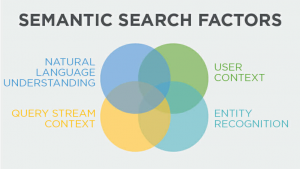The Evolution of SEO: Embracing Semantic Search in 2024
In the early days of SEO, keywords were the foundation of every strategy. SEO is the most important part to enhance the visibility of organic research. The more you could match your content to the exact phrases users were searching for, the better your chances of ranking high on search engine results pages (SERPs). However, as search engines have evolved, so has the importance of understanding and leveraging the concept of semantic search. In 2024, SEO is no longer just about keywords—it’s about understanding user intent, context, and the relationships between concepts. Welcome to the age of semantic search.
/blog/data-driven-seo-turning-insights-into-action/
1. What is Semantic Search?
Semantic search refers to the search engine’s ability to understand the meaning and context behind search queries rather than just matching keywords to web pages. It’s about delivering more accurate and relevant search results by considering the intent behind a user’s query, the relationships between words, and how those words are used in context.
For example : If someone searches for “Apple,” a semantic search engine will consider whether the user is looking for information about the fruit, the tech company, or something else entirely based on the query’s context and the user’s search history.
2. Why Semantic Search is Gaining Importance in 2024:
Search engines, especially Google, have made significant advancements in their ability to process natural language. So that user gets accurate results which they wanted to be. Google’s BERT (Bidirectional Encoder Representations from Transformers) and MUM (Multitask Unified Model) updates have shifted the focus from keyword-based search to semantic understanding. These updates enable Google to better understand the nuances of language, making it possible to deliver more relevant search results even for complex and conversational queries.
3. The Shift from Keywords to User Intent:
In the past, SEO was heavily focused on exact match keywords. However, with semantic search, the focus has shifted towards understanding and optimizing for user intent. Instead of optimizing content around specific keywords, SEO now involves creating content that answers the questions users are asking and solves their problems.
For example: Rather than focusing solely on the keyword “best running shoes,” content creators now need to consider the broader context, such as “What are the best running shoes for marathon training?” or “How to choose running shoes for flat feet?”
4. How to Optimize for Semantic Search in 2024:
A. Content Clusters and Topic Authority:
-
- Instead of creating isolated blog posts around specific keywords, think in terms of topic clusters. Organize your content into clusters centered around a core topic, with pillar content that covers the main subject and supporting content that dives into related subtopics.
This approach not only enhances user experience but also signals to search engines that your site is an authority on that topic.
B. Structured Data and Schema Markup:
-
- Use structured data to help search engines better understand the content of your pages.
-
- Schema markup allows you to provide context to your content, making it easier for search engines to interpret the meaning behind the data and present it in rich snippets, enhancing visibility in SERPs.
C. Answering Specific Queries:
-
- Focus on creating content that directly answers specific, long-tail queries. Use tools like Google’s People Also Ask feature to find common questions related to your topic and address them in your content.
D. Natural Language Processing (NLP):
-
- Write content in a conversational tone that mirrors how people naturally speak and ask questions. This will align your content more closely with how search engines process and understand language.
E.Content Quality and Relevance:
-
- High-quality, relevant content is more critical than ever. Ensure your content is comprehensive, up-to-date, and provides real value to users. Thin, keyword-stuffed content is less likely to rank well in a semantic search environment.
5. The Role of AI and Machine Learning:
AI and machine learning are central to the development of semantic search. Search engines are increasingly using AI to learn from user behavior, understand the nuances of language, and deliver more personalized search results. As AI becomes more sophisticated, SEO strategies will need to evolve to account for the ways in which AI interprets and ranks content. The content from the AI is well define and easily interpreted by the users.
http://blog/harnessing-ai-and-machine-learning-for-seo-success/
6. The Future of SEO in a Semantic Search World:
As semantic search continues to evolve, the future of SEO will be less about gaming the system with keyword tricks and more about truly understanding your audience. It will require a deep understanding of user intent, the ability to create content that speaks to that intent, and the use of advanced techniques like NLP and structured data to ensure that content is easily understood by both users and search engines.
Conclusion:
The rise of semantic search in 2024 is redefining the SEO landscape. Keywords are no longer the be-all and end-all of SEO strategy; instead, understanding and optimizing for user intent and context has taken center stage. As search engines become more adept at understanding language and delivering personalized results, businesses and content creators who embrace semantic search will be best positioned to succeed in this new era of SEO.
/blog/engage-and-rank-the-seo-benefits-of-quizzes-polls-and-interactive-tools/


